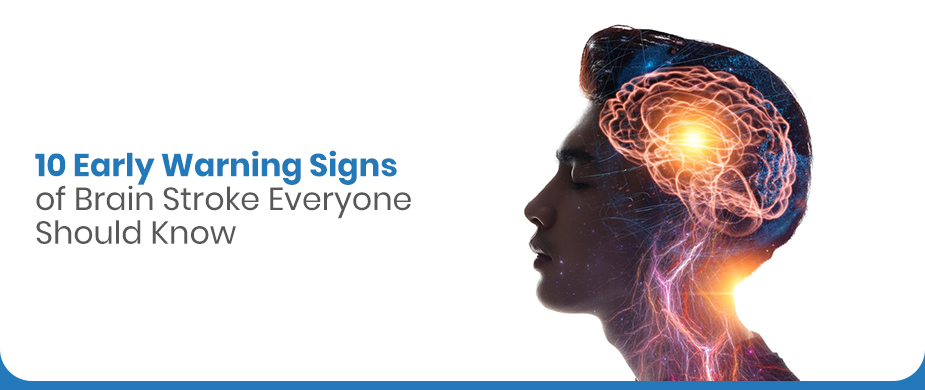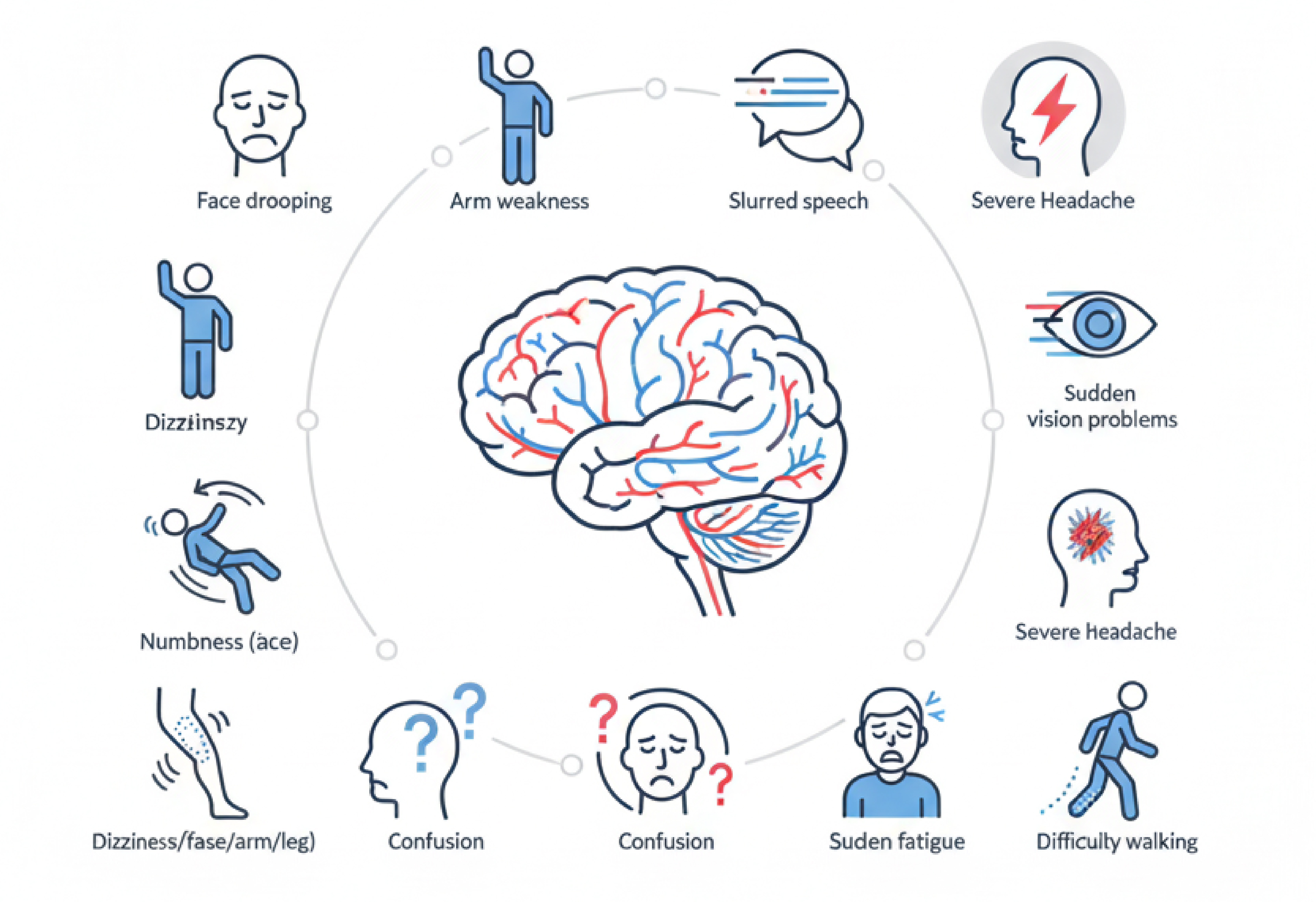
10 Early Warning Signs of Brain Stroke Everyone Should Know
A stroke happens when the blood supply to the brain is interrupted, and brain cells start dying within minutes. However, before that happens, your body gives you an early sign so that you can take timely action. Sadly, many people ignore these symptoms, thinking of them as just tiredness or stress.
Learning these early stroke warning signs can save a life, maybe even your own. Because when it comes to strokes, every second counts. And timely action is the real key to preventing severe conditions.

10 Early Signs of Stroke in the Early Stage
Be aware of the following early stroke warning signs so that you can take timely action.
1. One-Sided Face Drooping
You can observe one-sided drooping or numbing of the face, leading to an uneven smile. This happens due to a disrupted blood supply to the brain area that controls facial muscles.
2. Sudden Arm Weakness
There can be sudden weakness or numbness in one arm, which may cause trouble lifting or moving. This happens because a stroke blocks the transfer of messages between the brain and muscles on that body’s side.
3. Unable to Speak Properly
You might notice the person having slurred speech or having difficulty understanding others. This happens because the language and communication region of the brain gets affected.
4. Unexpected Numbness
You may notice one-sided numbness or weakness in the leg, arm, or face. This happens because certain brain cells aren’t receiving sufficient blood or oxygen.
5. Vision Issues
You can notice one or both sides blurry, or double vision, or an unexpected loss of sight. This happens because the vision-regulating area of the brain gets damaged.
6. Trouble Walking
There can be a loss of coordination or balance while walking. This happens because a stroke disturbs the brain part that maintains balance and movement.
7. Severe Unexplained Headache
One can experience a sudden, intense headache without a known reason. This may happen because a stroke can rupture a blood vessel in the brain, causing bleeding or pressure.
8. Perplexity or Confusion
There can be difficulty in thinking clearly or feeling confused about what others are trying to say. This happens because the brain’s processing centers get damaged during a stroke.
9. Dizziness or Loss of Coordination
One can experience off-balance or being clumsy while standing or walking. This happens because a stroke damages the coordination and spatial awareness area of the brain.
10. Fainting or Seizures
You can notice loss of consciousness or unexplained seizures. This happens because the alertness and the electrical activity-controlling region of the brain get damaged.
How to Recognize Stroke Early
You can recognize a stroke early by knowing about the simple acronym “BE FAST” for stroke symptoms. This means you have to notice Balance, Eyes, Face, Arms, Speech, and Time.
- B - Balance: If balance is impacted, like with difficulty walking or loss of coordination.
- E - Eyes: If impairment in one or both eyes functions like sudden loss of sight, blurred vision, or double vision.
- F - Face: If noticing impairment in face muscles, like one-sided facial drooping or uneven smile.
- A - Arms: Difficulty in lifting both arms; one drifts downward.
- S - Speech: Difficulty in talking, like slurred speech or being unable to understand others.
- T - Time: If you notice any of the above given signs, call emergency services immediately, as every moment can make s difference.
Conclusion
In your usual moment, you can waste time scrolling through screens, but when a stroke hits, every minute matters. That’s why recognizing early stroke signs is crucial to save lives and reduce brain damage. In those golden hours, act fast and get medical help to make all the difference in recovery. Because time lost is a significant brain function lost.
FAQs
Q1: Can a stroke cause a swollen tongue?
A: Yes, but it is very rare that a stroke leads to a swollen tongue (orolingual angioedema). However, certain stroke treatments like clot-busting drugs (thrombolytic treatment) when given to patients taking angiotensin-converting enzyme (ACE) inhibitors. They can trigger tongue swelling as a rare side effect.
Q2: Can a stroke affect your legs?
A: Yes, a stroke can affect the part of the brain controlling body movement. This leads to weakening or paralyzing one side of your body, including your legs.
Q3: What is the 4-hour rule for stroke?
A: The 4-hour rule is a critical window. In this time frame, the stroke patient must receive medical treatment for stroke, especially clot-busting therapy. Because during this time frame, they are most effective at reducing brain damage and improving recovery.
 By -Dr Aaksha Shukla |
September 30, 2025 | 9 Min Read
By -Dr Aaksha Shukla |
September 30, 2025 | 9 Min Read
10 Superfoods That Boost Your Brain Power
5 Most Common Sports Injuries and Their Quick Treatments
12 Everyday Habits That Damage Your Spine
Brain Stroke: Causes, Warning Signs & Emergency Treatment
10 Early Symptoms of Brain Tumor You Should Never Ignore
How to Choose the Right Neurosurgeon in Delhi NCR
How Stress Affects Brain Health: Neurological Insights
Early Signs of Spinal Disorders in Working Professionals
How Advanced Neurosurgery Is Saving Lives: A Look Inside IBS Hospitals
Epilepsy: Diagnosis and Treatment in Delhi
Stroke Recovery: How a Comprehensive Neuro Rehab Plan Makes the Difference
Early Signs of Brain Tumor You Should Never Ignore
Benefits of Neuro-Navigation in Brain Surgery
Warning Signs Of Stroke You Should Never Ignore
Diagnosing Autism Spectrum Disorders Early: Why It Matters
Spine Surgery vs Physiotherapy: Which Is Better for Back Pain?
World Brain Day 2025: Importance of Brain Health
Parkinson’s Disease vs Essential Tremor: Key Differences
Memory Loss: When Is It a Sign of a Neurological Condition?
How To Reduce Stroke Risk Naturally: Lifestyle Changes For Prevention

